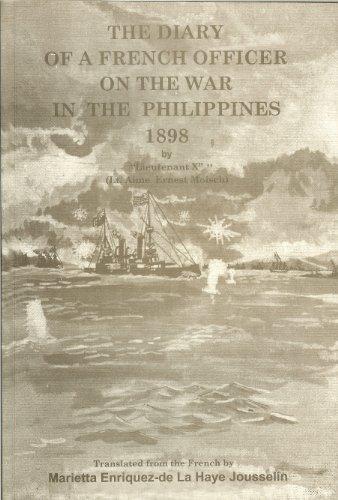Aguinaldo in Manila
Aguinaldo has not lost time. Within a few days he has established a revolutionary government in Cavite and has assumed a dictatorship. The supporters of the Revolution are those who led the armed revolt last year. These people have assiduously prepared the Republic on the basis of the insurrection. The province of Cavite was, and remains, their fiefdom. The insurgents and their dictator show that their political belief is quite Latin. The struggle of Bolivar, the Peruvians and Mexicans against Spain must have been similar to this insurrection.
The American squadron is in no position to attack Manila. It has exhausted its ammunition and is waiting for new supplies. If the Americans were to bombard Manila, this could benefit the insurgents, as long as Admiral Dewey has insufficient troops to occupy the capital. Thus, they are dealing with the Filipinos very tactfully, since they cannot do otherwise. Also, they will try to restrain the movements of their allies rather than push them to action. Asiatic cunning is not evident in Aguinaldo. He appears to have implicit faith in the ability of the Americans to bring independence to his country, which shows his limited knowledge of history. One must hold on to what one has, and if this is not done from the start, one eventually loses one’s rights to his possessions. As long as the American soldiers have not landed, Aguinaldo remains master of the situation. With the arrival here of each American regiment from San Francisco, the threats to the young Republic increase. Aguinaldo proclaimed the Republic on the 24th of May in Cavite, eight days ago.
Since then, the dictator has sent messages and appeals to the Filipino people dispersed everywhere. This was how Aguinaldo entered Manila three nights ago. His proclamations were secretly delivered to the consuls and foreigners. Aguinaldo, speaking in the name of the Revolution, declared that the Filipinos want a republic. Once free, their intention is to elect a president and two chambers. They want to eliminate both the clergy and the religious orders at all cost. Aguinaldo has promised security to everyone, and guarantees respect for the goods and persons of all foreign colonies in the Philippines. The Chinese themselves will not suffer any hardship. On the other hand, every Filipino who has betrayed his country by acting as a spy or emissary for the Spaniards will be treated as traitor to the fatherland.
The provinces around Manila are all in a state of rebellion, which is gaining momentum. For the past two days there has been constant cannon fire. The reply of the Spaniards on land is: “They are nothing but insignificant pockets of fighting.” But the Tagal who works as a coachman or domestic in a foreigner’s household is fully aware that Aguinaldo’s troops have killed a large number of Spaniards. There is not a single Tagal who is not spreading this news with secret and profound joy. There is a deep-rooted hatred which surfaces when Tagals say, “Large numbers of Spaniards have been killed.” If Aguinaldo has, or pretends to have, such confidence in the Americans, this is not shared by the Tagals. Actually, they are neither for the United States nor the Spaniards. They hope to use one against the other. There is proof that the Americans are using the same strategy.
In their manifestos and their proclamations, as well as their gatherings, it is remarkable that the Filipino leaders are haunted by the French Revolution. Added to this is a religious undertone which recalls the American independence. Whether one likes it or not, these Indians are talking of a republic, of liberty, equality, fraternity, of a natural law reminiscent of western concepts. All revolutions resemble each other, based on the vindication of an idea and of human dignity. It says a great deal for the Filipinos that this sublime symbol is recognized.
